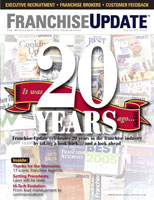Is the bloom off the rose of alternative dispute resolution?
To those readers who are interested in legal affairs in the franchising context and are not subscribers to the American Bar Association's Forum on Franchising's listserv, you are missing one of the greatest shows in town. Listservs, chat rooms, blogs, and whatever else, are means to dialogue on the Internet and can turn into today's electronic equivalent of a lynch mob, as demonstrated by two recent exchanges on the forum's listserv on the subject of arbitration.
The first arbitration discussion turned out to be a scathing attack on arbitration as an alternative means for dispute resolution. Very interesting. Ten to 20 years ago, arbitration was the proverbial fair-haired kid. It was touted as being cheaper, faster, and less confrontational than litigation. I also recall that in those days, only a small number of franchise agreements contained arbitration clauses - maybe 20 to 25 percent. Today, my experiences suggest that around half, perhaps more, of the franchise agreements in use contain such provisions, presumably as a result of the mantra sung by the advocates of arbitration.
The tenor of the comments on the listserv in this recent discussion, however, was that arbitration has become like The Blob (for those of you old enough to remember that horror film). It has morphed into an uncontrolled creature that now threatens any presence of due process that may have existed previously in dispute resolution. Commentators on the listserv claim that it is not cheaper, nor is it necessarily faster. And it is not less confrontational, either.
Some of the commentators blame this on the organic growth in the arbitration clause itself. In earlier days, these clauses were typically 50 words or fewer, and simply said that arbitration was mandatory and subject to the rules of the American Arbitration Association (AAA). Today, as one listserv curmudgeon pointed out, the clauses contain provisions that remove the neutrality of the process and turn it into a complicated and often lopsided tool to suppress franchisees. This premise is based on the fact that in some cases, the clauses are clearly drafted to give franchisors advantages, such as arbitration in the franchisor's home town; requirements and limitations imposed upon franchisors and not upon franchisees; and carve-outs that favor franchisor interests (e.g., arbitration not applicable to trademark disputes).
Somewhat surprising, however, was the level of hostility demonstrated not only by attorneys whom I know to be franchisee-rights oriented, but from attorneys whose trade is to protect franchisor interests. Thus, the prevailing sentiment came from both sides of the spectrum - a perfect environment to create a mob psychology preaching death to arbitration.
If that were not enough, a second discussion ensued on the listserv on the subject of arbitration only a few days later, and if I recall correctly, even before the vetting on the issue described above had been fully aired. This second discussion focused on the AAA's rule that where one party to an arbitration clause refuses to pay the arbitration fees in advance, the arbitration panel may require the other party to pay all of the arbitration fees before the arbitration will proceed.
In the case presented on the listserv, the irony of the situation was manifested by the fact that the franchisor - which had included the arbitration clause in its agreement - was the party that refused to pay the fees required under the AAA's rule. The remedy for the party who fronts the bill is simply that if it prevails in the arbitration, it might recover the amount of costs it has fronted for its adversary. Not a very appealing solution to a cash-strapped party, or one in which the non-paying party, franchisor or franchisee, may be on the verge of going under. Where's the justice here?
While several commentators viewed this scenario with perhaps disappointment, acknowledging the limits of the U.S. justice system, others demanded blood, penalties, and summary judgment against the party who refuses to pay the arbitration fees in advance. The lynch mob was, again, out in full force. I will note that in the many years that this listserv has been in place, I don't recall ever seeing any comments as vitriolic as the ones published on this issue.
Limited sample?
One should not necessarily view the commentators on these two subjects as being representative of franchise lawyers in general. The listserv responses may fall under the squeaky wheel rubric. I suspect there are still a good number of franchise lawyers out there who do prefer arbitration. I am personally aware of several recent arbitration proceedings that were concluded in less than a year. I have also seen arbitrations, especially those held before single arbitrators, that clearly were less expensive because the so-expensive discovery process was abbreviated, and there were few or no procedural or summary judgment motions prior to the arbitration hearing.
However, I have also seen the horror stories that were brought to light on the listserv. Moreover, if one reads the reported cases where issues surrounding arbitration were involved, it appears that when the parties are in die-hard, no-holds-barred adversarial proceedings, a high level of resources may be devoted to procedural issues - who decides which issues are arbitratable, where should the arbitration be held, how supplementary judicial proceedings are handled, or how to deal with the problem that indispensable parties are not bound by the arbitration clause - issues that don't easily lead to simplicity or speed in dispute resolution. My take: the jury is still out, but I think the tide has turned - or at least become skeptical - about the liturgy of benefits deriving from arbitration.
Mediation questioned, too
Has this same hostility been evident with respect to the second fair-haired child of alternative dispute resolution: mediation? I must confess that after the second skirmish on the listserv discussed above had gone slightly past its peak, I decided it was time for the mob to concentrate its efforts elsewhere, and thus asked (on the listserv) whether clauses that mandated mediation were a good or bad idea. My working hypothesis was that making the parties mediate when they were not so inclined was essentially a waste of time. You know, you can lead a horse to water, but...
Let me state that I still believe that to be the case, and therefore will continue not to put mandatory mediation clauses in the franchise agreements I draft. However, two arguments were presented in the listserv dialogue that may have softened my bias against mandatory mediation clauses somewhat. The first is that because of the low cost and relatively fast pace at which mediations can proceed, there is little lost by requiring an early mediation. And if even a low percentage of these forced mediation proceedings (say one in three) produce settlements, there are significant savings overall when they are successful.
The second persuasive argument in favor of mandatory early-stage mediation is that it will eliminate the concern that a party desiring early mediation will be perceived as weak.
Let me go officially on the record that I generally favor mediation when the parties are willing to look at themselves in the mirror and truly want to move on with their lives. But franchisors and franchisees must keep in mind that mediations are not inherently neutral either, and can lead to bad deals. Decisions are made quickly without necessarily giving the parties the chance to reflect on a proposed outcome, sometimes resulting in so-called "buyer's remorse."
Moreover, mediations often involve issues that are very complex. If the case involves primarily the payment of money, then perhaps the issues are clear enough for a simple solution and the only real thing to be decided in mediation is how much one wants to pay out or is willing to receive to make a dispute go away.
However, some cases impose substantial ongoing obligations on parties, or in some cases may involve buyouts of interests in going concerns. And in a mediation, the resolutions of the these disputes are documented in one- or two-page agreements that often supplant the more lengthy and complex documents that I and my fellow transactional lawyers use to generate income to put our children through college at expensive institutions of higher learning. One must keep in mind that, all kidding aside, there are reasons for transactional documents not being one page - one being to try to fully memorialize the understandings of the parties, and to state precisely who bears the risk of certain aspects of the deal.
Although I don't favor excessively lengthy agreements of any type, I also don't think that one-page agreements are very good solutions to complex problems. Inadequately documented solutions may only transfer the focus of a dispute from one area into another, and as part of this transference process, leverage may unknowingly be shifted between the parties as well.
I think I will bury this column in a 10-year time capsule. Then, in 2017, we should reexamine what the perceptions toward arbitration and mediation are at that time. It now appears that the bloom is off the rose as to arbitration, at least this week. As for mediation, I think it is too soon to tell how effective this tool for alternative dispute resolution has been, or will be.
Rupert Barkoff is a partner in the Atlanta office of Kilpatrick Stockton LLP, where he chairs the firm's Franchise Practice Team. He is past chair of the American Bar Association's Forum on Franchising, and editor-in-chief of Fundamentals of Franchising.
Share this Feature
Recommended Reading:
FRANCHISE TOPICS
- Multi-Unit Franchising
- Get Started in Franchising
- Franchise Growth
- Franchise Operations
- Open New Units
- Franchise Leadership
- Franchise Marketing
- Technology
- Franchise Law
- Franchise Awards
- Franchise Rankings
- Franchise Trends
- Franchise Development
- Featured Franchise Stories
FEATURED IN

Franchise Update Magazine: Issue 3, 2007








 The franchise listed above are not related to or endorsed by Franchise Update or Franchise Update Media Group. We are not engaged in, supporting, or endorsing any specific franchise, business opportunity, company or individual. No statement in this site is to be construed as a recommendation. We encourage prospective franchise buyers to perform extensive due diligence when considering a franchise opportunity.
The franchise listed above are not related to or endorsed by Franchise Update or Franchise Update Media Group. We are not engaged in, supporting, or endorsing any specific franchise, business opportunity, company or individual. No statement in this site is to be construed as a recommendation. We encourage prospective franchise buyers to perform extensive due diligence when considering a franchise opportunity.